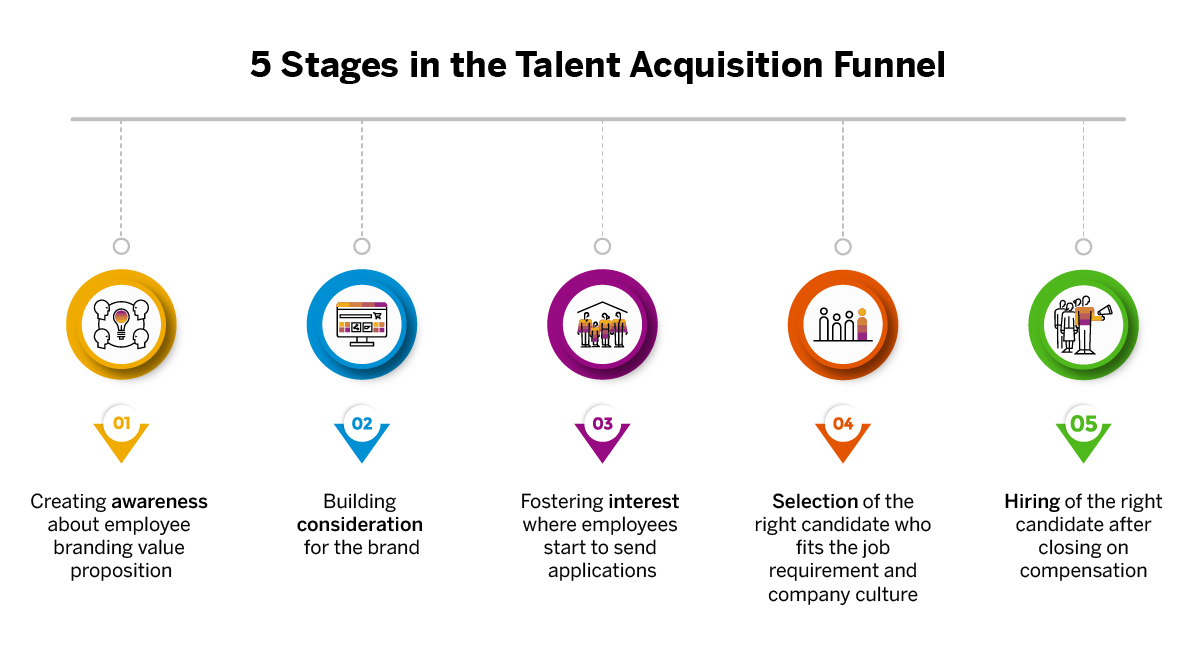All too often, talent acquisition and talent management are used within the broader context of HR functions. In today’s highly specialized world, talent acquisition or recruiting, and talent management are two distinct functions with unique processes.
In our guide, we will demystify the distinction between talent acquisition and talent management, and HR’s role in ensuring both recruitment and management of talent is always aligned to company’s growth strategy.
What is Talent Acquisition?
Talent acquisition is essentially a systematic process that a company carries out to identify and acquire those skilled employees who meet its professional requirements.
The stages in talent acquisition:
- Creating Awareness about Employee Branding value proposition
- Building Consideration for the brand
- Interest where employees start to send applications
- Selection of the right candidate who fits the job requirement and company values/culture
- Hire of the right candidate after closing on compensation

This recruitment funnel combines the key steps HR uses towards talent acquisition for filling the job roles of a company to achieve short term or long-term goals. The core responsibilities of talent acquisition include future resource planning, diversifying the employment force and employer branding in the market.
There are two ways through which a talent acquisition team operates within an organization. Either it is a part of the human resources department, or it is a separate entity. At times, this important process is outsourced to a third-party agency.
What is Talent Management?
Talent management, on the other hand, is a constant process with the key objective of ensuring highly motivated employees. It focuses on management of employees that includes developing their skill sets and engaging them continuously to improve their performance. When done right, talent management can help companies to have very productive and engaged employees.
What is Recruitment?
Recruitment is a process carried out by a company to identify the potential candidates for a job profile and select them for the role. It is done by attracting potential candidates and screening their suitability through interviews. The span and scale of the recruitment process depends on the size of the company and the number of existing employees. While large companies have a team of recruiters to carry out the job, in small companies, the entire work is the responsibility of just one person, the HR manager. The recruitment is conducted through different media, like printed or digital advertisements, social media links and job boards.
Differences between Talent Acquisition and Talent Management
Talent acquisition and talent management cannot be used interchangeably but are two phases of ‘before’ and ‘after’ of a candidate joining the company. Of the two processes, talent acquisition focuses on hiring the right candidates based on their potential and skills, while talent management takes over after a candidate joins the company. Talent management keeps track of the training and development of the new employees. Programs are designed to improve performance through constant upskilling which also keeps them engaged. It is this factor which differentiates it from the process of recruitment as well. However, the talent management team requires a lot of involvement of HR, either directly or indirectly.
Differences between Talent Acquisition and Recruitment
Many people might perceive the term ‘talent acquisition’ to be a new and fancier way of calling the conventional process of recruitment of a company. It is because the essence of both still lies in hiring new people for the organization. While the overall objective of talent acquisition is more or less the same as recruitment, there are a few crucial differences in their processes and approaches.
While recruitment is all about fulfilling the momentary purpose of filling a particular vacancy and is a short-term goal, talent acquisition is a much longer and strategic process. It’s long term and involves:
- Planning and strategy
Compared to recruitment, talent acquisition uses a comprehensive strategy that seeks to understand nature of business, current and future workplace, and workforce requirements.
- Workforce distribution
Understanding the pulse of different departments and workforce teams within a company is important for talent acquisition teams. Parameters like skills, experiences and competencies required for a position are analyzed better when a proper plan is in place, one of the key aspects of talent acquisition.
- Employer branding
In today’s digital world, brands are using newer ways to interact and connect with consumers and even talent (think LinkedIn, Glassdoor, etc.). Talent acquisition takes a broader approach to creating a positive image of the company and its work environment and goals. The end-goal: inspire trust in potential candidates and new hires.
- Talent scoping
Quality content comes from more detailed research. This is possible through data collected from talent management software. Having a talent acquisition team enables organizations to source talent from diverse locations and map them to the right job role.
- Analytics
Using key metrics for proper tracking and analysis, the talent acquisition team can fill existing vacancies. They can also have a database of potential candidates to connect with for the future.
The Common Skills Required for Talent Acquisition and Talent Management
While talent acquisition and talent management are entirely different processes, certain skills are common for both.
- Communication skills
Given the people-centric nature of these job roles, the ability to communicate well, both speaking and writing, is important. It’s also important that professionals in these two functions (talent management and acquisition) can negotiate and mediate between a job seeker and the company. Of course, new modes of digital modes – social media recruiting, gamified assessments, and mobile-centric processes – have redefined the communication processes too.
- Active listening skills
Unlike before, millennials and Gen Z have the advantage of having more platforms and media to express an opinion. This has made active listening an important skill, that needs to go beyond a simple telephonic or first-level interview. A talent acquisition specialist or a talent management specialist should assess the potential candidate’s diversified presence in the online world and collect information from their social media accounts using dedicated talent management software. Active listening is beneficial for generating an assumption of perspectives of a candidate, thereby easing the decision-making process.
- Planning skills
Information gathered through communication and active listening will help both talent acquisition and talent management professionals to be more effective and plan smarter. For a talent acquisition specialist, overall planning needs to be more strategic that aligns with business needs of various stakeholders. Hence, the objective would be to fill the immediate vacancies and build an active pipeline of potential candidates for future hires.
- Learning skills
Both talent acquisition and talent management professionals should be willing to learn new technologies and have a natural curiosity that will help them acquire new skills. These traits will ensure that both the professional and organization are open to new ways of working and can more easily drive transformational processes. Open cultures are generally synonymous with innovation and hence are easily able to attract millennials.
- Relationship building skills
To ensure long-term associations, both talent acquisition and talent management specialists should prioritize candidate experience and qualities. Both these aspects can form a basis to build a relationship. It is also instrumental in the establishment and promotion of a brand as an employee-friendly company and creating a sustainable engagement between all the employees of the company. The focus should be more on networking and relationship management, which is possible using recent developments in artificial intelligence.
- Social skills
These days, organizations are looking for professionals who display both IQ and EQ in equal measure. Such individuals can drive a balanced and harmonious work environment conducive to employee wellbeing and productivity. These nuanced skills are important as they enable talent acquisition and talent management specialists to empathize and take the right steps to solve employee challenges.
- Analytical skills
Leveraging data through analysis and derived insights can help talent acquisition professionals to find gaps in the hiring process, tweak it and save time and costs, making the process itself more effective. Being able to understand granular data and correlate it to the bigger hiring picture will help streamline the hiring process.
- Tech skills
Digital transformation is a part of organizational strategy, and in recent times the pace of digitalization has been faster than ever before. In such circumstances, it’s critical for talent acquisition and talent management professionals to be comfortable with technology, use the right talent management software and tools such as applicant tracking systems and performance management platforms.
- Social media skills
Social media has become an important part of the hiring process considering that today’s digital native generation spend a significant amount of time online. From posting job ads on LinkedIn and other online platforms, companies are now focused on digital media to ensure they reach a wider pool of potential hires. A talent acquisition specialist and a talent management specialist need to be well-versed in using social media to connect with millennials and Gen Z while amplifying company vision, mission, and culture to build an attractive employee value proposition using social platforms.
- Multitasking skills
Unlike earlier, where human resource processes were transactional and functional, today it is strategic. Talent acquisition and talent management professionals need to be well-versed in juggling their job roles, prioritizing tasks and being part of the larger ecosystem when it comes to driving business objectives. Essentially, this means both these specialists need to be able to multitask and become achievers, instead of being doers alone. Whether it’s helping the organization to achieve business goals through hiring the right resources or ensuring these resources are productive and engaged by constantly providing new learning and development (L&D) opportunities, both talent acquisition and talent management professionals need to have strong multitasking skills.
Role of HR
HR has a significant role in both talent acquisition and talent management, though the processes that are followed for each vary. For talent acquisition, HR carries out several tasks, such as assessing the available talent and discussing the required talents. The other tasks in talent acquisition performed by HR are analyzing the gap between availability and requirement of talent and building strategies and measuring the success rate of the plans created to bridge the skills gap.
For talent management, it’s a different process. It includes analyzing skills gap in the existing talent pool and mapping it against the ‘ideal’ profile, creating L&D plans that nurture and manages this talent. HR also analyses the talent strategy and succession planning; creation of a talent plan for the long run; reviewing of talent available in the organization and L&D plans which also includes team-building exercises, workshops, and benchmarking activities.
Which is more productive – talent acquisition or talent management?
Though talent acquisition and talent management use different processes they are interlinked. Organizations need to invest in hiring the right professionals for the talent acquisition and management teams. Considering that there’s a talent deficit for certain job roles and in certain industries, it’s imperative to have both these teams in place. Having dedicated talent acquisition and talent management teams, especially in large enterprises, makes the hiring process (recruitment and retention) more effective and impactful.
In today’s business environment where inclusion and diversity are an integral part of organizational culture and values, having a well-knit team of talent acquisition and management professionals will ensure policies are well thought out and implemented. It also means that these teams collaborate to constantly refine processes and systems, a must in an ever-evolving world.
As Workplace 4.0 becomes more pervasive, talent acquisition and talent management teams need to work together to keep attrition levels in check and minimize impact on the organization. What the new working models (hybrid working and work from anywhere) are also doing: making organizations question whether talent acquisition and talent management should continue to work as two different functions, or should they be combined under one. It’s an ongoing debate and one that will evolve over the next couple of years.
And what does this mean for talent acquisition and talent management specialists?
Perhaps, it’s the right time to develop transferable skillsets and explore new learning opportunities to be prepared when the great shift occurs!



